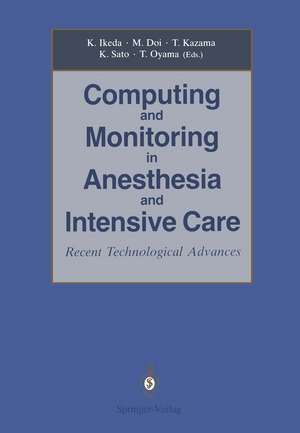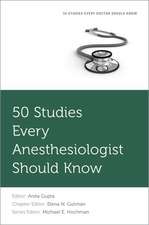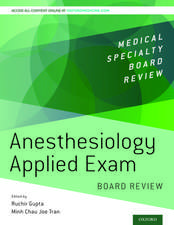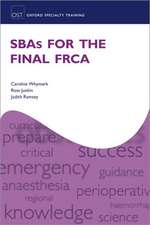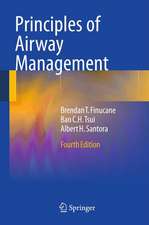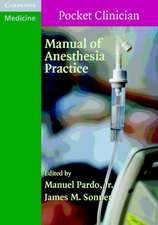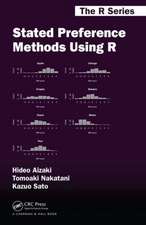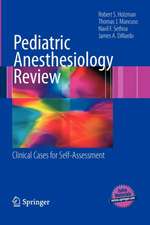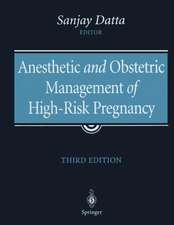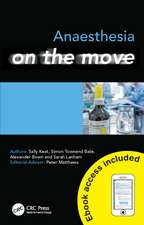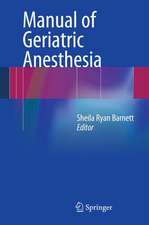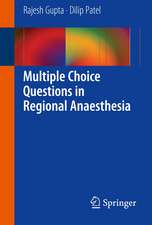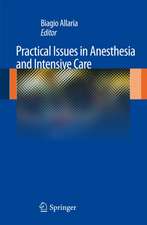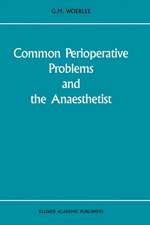Computing and Monitoring in Anesthesia and Intensive Care: Recent Technological Advances
Editat de Kazuyuki Ikeda, Matsuyuki Doi, Tomiei Kazama, Kazuo Sato, Tsutomu Oyamaen Limba Engleză Paperback – 19 apr 2014
| Toate formatele și edițiile | Preț | Express |
|---|---|---|
| Paperback (1) | 677.50 lei 3-5 săpt. | +40.75 lei 10-14 zile |
| Springer – 19 apr 2014 | 677.50 lei 3-5 săpt. | +40.75 lei 10-14 zile |
| Hardback (1) | 721.63 lei 38-44 zile | |
| Springer – 25 aug 1992 | 721.63 lei 38-44 zile |
Preț: 677.50 lei
Preț vechi: 713.16 lei
-5% Nou
Puncte Express: 1016
Preț estimativ în valută:
129.66€ • 134.86$ • 107.04£
129.66€ • 134.86$ • 107.04£
Carte disponibilă
Livrare economică 22 martie-05 aprilie
Livrare express 11-15 martie pentru 50.74 lei
Preluare comenzi: 021 569.72.76
Specificații
ISBN-13: 9784431682035
ISBN-10: 4431682031
Pagini: 515
Ilustrații: XXV, 515 p.
Dimensiuni: 170 x 244 x 30 mm
Greutate: 0.86 kg
Ediția:Softcover reprint of the original 1st ed. 1992
Editura: Springer
Colecția Springer
Locul publicării:Tokyo, Japan
ISBN-10: 4431682031
Pagini: 515
Ilustrații: XXV, 515 p.
Dimensiuni: 170 x 244 x 30 mm
Greutate: 0.86 kg
Ediția:Softcover reprint of the original 1st ed. 1992
Editura: Springer
Colecția Springer
Locul publicării:Tokyo, Japan
Public țintă
ResearchDescriere
In April of 1991, 425 partICIpants from 18 countries met in Hamamatsu in Japan for the 6th International Symposium on Computing in Anesthesia and Intensive Care (lSCAIC). The meeting was one of the most spectacular academic and fruitful in the history of ISCAIC. We had four days of fascinating presentations and discussions covering many areas of technology in Anesthesia and intensive care. New technologies were presented and old technology reexamined. The measures of success of the meeting were the excellent research material in oral and poster presentations, and state of the art reviews of the latest issues by distinguished worldwide key speakers. It must be sure that the meeting was most effective to promote and disseminate up-to-date information in these fields across the participating countries. The aim of this book is to record the exciting achievements of the meeting and extend them further among our colleagues. We hope the readers of this book will share the same excitation as well as the latest information in this speciality. Finally we would like to extend our deepest gratitude to all participants and others for the contribution to the compilation of this book. Kazuyuki Ikeda, M.D.
Cuprins
Patient Safety: Minimum Requirements and Advanced Techniques in Monitoring.- Minimum Monitoring Requirements (USA).- Oxygen Monitoring in Respiratory Gas.- Anesthetic Gas Monitoring.- Intraoperative Echocardiography.- CNS Monitoring.- Patient Monitoring — The European View.- Artificial Intelligence.- Artificial Neural Networks in Medical Monitoring: A Primer for Physicians.- The Use of Model and Artificial Intelligence Techniques in Patient Monitoring.- Expert System.- A Computational Architecture Using Procedural Reasoning for Decision Support in Anesthesiology.- Critical Care Decision Support Systems.- Intelligént Alarm System for Anesthesia (IASA).- A Knowledge Based Alarmer for the Postoperative Care of Cardiac Patients.- Medical Expert Systems with Physiological Models for Hemodynamical Monitoring.- Information Interpretation in a Real-Time Knowledge-Based Respiratory Monitoring System.- Computer Assisted Diagnostic Procedures in the Pain Clinic Using an Expert System.- Simulation and Modeling.- ASC: Educational Anesthesia Simulator with Expert System.- Digital Computer Simulation of Cardiovascular System in Bleeding Patient for Clinical Management.- Gas Man Simulates Correct Alveolar Plateaus and Quantifies Overpressure for Desired Alveolar Tension.- Real Time Joint of Pharmacokinetic Simulation and Monitoring in Inhalational Agents.- A 24-Hour Prediction Model of Blood Pressure Employing Endocrine System and Autonomic Nervous System.- A Simulation Analysis for Optimal Plasma Potassium Concentration during Cardiopulmonary Extracorporeal Bypass.- Eucapnic Hyperpnea Facilitates Recovery from Inhalational Anesthesia.- Anaesthetic Agent Uptake and Distribution.- A Theoretical Analysis of Optimal Control of Cardiovascular System.- Education.- A Revised Computer Program for Respiratory Care and Blood Gases.- Use of Pharmacologic Models for Teaching Anesthesiology Residents.- Automated Control.- Computer Controlled Infusion Systems.- Computer Controlled Continuous Infusion.- A Computer-Aided Controller of Fluid Infusion Rate in Post- Operative Management of Open Heart Surgery.- Computer Aided Patient (CAP) Care System.- Fluid Control Based on Fuzzy Control Algorithm.- A Simulation and a Control System of Neuromuscular Blockade.- Evaluation of a Computer Aided Propofol Infusion System.- Computerised Alfentanil Infusion in Postoperative Analgesia.- Assessment of the Value of Computerized Propofol Infusion.- Development of a Computer Controlled Infusion System.- Isocapnic Clamping with Feedback and Feed-Forward Control.- The Intelligent Control System of Physiological System Regulation.- Performance Evaluation of a Closed-Loop Sodium Nitroprusside Delivery Device during Hypotensive Anesthesia in Mongrel Dogs.- Adaptive Control of Arterial Pressure: A Supervisor can Improve Safety and Efficacy.- A Computer Control System of Applying Anesthesia Using Fuzzy Logic for Medical Operation (Categorization of anaesthesiologists thinking represented by artificial intelligence and comparison of each category).- Automatic Adjustment of Minute Volume by Carbon Dioxide Excretion with Servocontrol System.- Patient Data Management System.- Patient Data Management.- Anesthesia Records, Displays, and Alarms.- PDP System/PC an Efficient Combination for Data Management in the Intensive Care Unit.- Data Management in the Operating Room and Intensive Care.- Computerized Monitoring and Recording System in Anesthesia and Intensive Care Medicine Using an Engineering Work Station.- Computerized Intraoperative Monitoring System at Montefiore University Hospital.- Microcomputer Management of Anesthetized Patients’ Information.- Laboratory Data Management in Our ICU.- A Computerized Graphic Monitoring System for the Management of Open Heart Surgery.- The Anesthesia Information Console: An Integrated Information System for Anesthetic Care.- Perioperative Data Management System — An Initial Report on the Intraoperative Patient Data Management System.- Automated Analog and Digital Data Logging System in Intensive Care Unit.- Clinical Process Models for Intensive Care.- Ohmeda Arkivel Patient Information Management System — An Operating Room Based Database Analysis Network.- Network.- LAN in the Automatic Collection of Postoperative Monitoring Data.- Multiple Media for Monitoring Respired Air during Anesthesia.- On-Line Data Integration System in Kanazawa Medical University Hospital.- Intraoperative Transmission of Digital Data Using Intelligent Radio Modems.- Use of an Inter-Bed Local Area Network System in Operating Room.- A System of Computer Integration of Patient Monitors in Operating Rooms.- Development of Operation System.- On-line Multi-Channel Audio-Video Signal Transmission by Optical Fiber and its Clinical Use.- Wireless Data Communication: Example of an Application for the Operating Room.- Remote Monitoring of Home Ventilation Through the Personal Paging System.- Data Base.- Anesthetic Concerns in Uncommon Diseases — A New Database.- Data-Base in Our Department Using REXAS as a Sort of LAN.- An Application of the Optical Drive System for Keeping Anesthesia Records.- An Ultrafiche Storage of Anesthesia Case, Computer Display and Search by a Scanner.- Management of Anesthesia Record Using Hyper-Text System.- Data Record.- Monitor; a Low Cost, Versatile Acquisition Program.- Time Keeper and History Maker in an Anesthesia Practice.- Clinical Usefulness of Fiberoptic D-C Coupling EKG Monitoring System.- Registration of Data during Narcosis for Scientific Evaluation.- Registration and Documentation of All Data Relevant for Narcosis.- Continuous Digital Values Recording in Hemodynamic Research.- An Application of a Data Transfer Program (Lotus Measure™) with a Pulse Oximeter.- A Personal Computerized Anesthesia Recording System — With Multiplexer and Serial Interfaced Monitors.- Automated Record Keeping.- Information Management Systems, Especially the Automatic Anesthetic Record Keeper.- The Influence of the Automatic Anesthetic Recording on Surgeon- Anesthetist Relationship.- Automatic Recording in Clinical Anaesthesia: Three Years Experience.- What do We Write on Anesthesia Records? — Analysis of Descriptive Information.- Automated Data Collection in a Simulated Respiratory Circuit.- Development of a Computer-Assisted Monitoring System for the ICU Patient Management.- Anesthesia Machine.- Anesthesia Machine Design.- Systems Engineering.- A Turning Point to Systems Engineering.- People and Machine Interface.- Anesthesia Record Keeping by Voice Recognition System.- Bar Code System Applied to Operation Center of University Hospital.- Medical Data Collection — The Human Interface Bar Code Entry, Hand Held Terminals.- Visibility of the Luminous Type Numerical Display Devices Installed the Medical Diagnostic Instruments Influenced by the Irradiation Illuminance.- A Compact TV Screen, a New Monitoring Device of Operative Field.- Quality Assurance.- Minimum Anaesthetic Peroperative Audit Dataset.- Computerized Quality Assurance Assessment of Obstetric Anesthesia Care: New Outcome Indicators.- Quality Assurance in Anesthesia Practice from the View Point of Personal Workload with Variability.- Patient Monitoring (Circulation).- Validity of Continuous Cardiac Output Measured by a Doppler Pulmonary Artery Catheter Versus Thermodilution, and Effect of Distal Angle on the Variance Between Methods.- Noninvasive Continuous Blood Pressure Measurement with the Cortronic APM 770™.- Intraoperative Myocardial Ischemia Detected by Multiple ECG Leads.- Continuous Thermographic Determination of Myocardial Ischemic Area in Dogs.- New Approach to Central Venous Pressure Monitoring.- Pressure Pulse Transmission Ratio (PPTR) of Inferior Vena Cava and the Blood Volume Status.- Online Analysis of Cardiovascular Control Factors by Power Spectral Analysis on the Heart Rate Variability during Anesthesia.- Continuous Evaluating System of Cardiac Output in Patients with Intra-Aortic Balloon Pumping.- Continuous Pulse Contour Cardiac Output during Major Abdominal Vascular Surgery.- Calculation of Pulmonary Capillary Pressure from Pulmonary Artery and Venous Wedge Pressures in Children.- Clinical Application of CCOM — Report of Post Op. Bleeding Case.- Continuous Cardiac Output Monitoring System Applying Fick’s Principle.- Continuous, On-Line, Real-Time Spectral Analysis of Heart Rate Variations during Anesthesia.- Patient Monitoring (Respiration).- End-Tidal PCO2: A Clinical Noninvasive Cardiac Output Monitor.- Ventilator Work Ratio: A Guide to the Adequacy of Weaning.- Measurement of Respiratory Work in the Breath by Breath Technique on the Continuous Respiratory Monitoring System in ICU.- Measurement of Lung Mechanics in Mechanically Ventilated Infants.- Respiratory Loop Analysis Using the Respiratory Inductance Plethysmography in Infants and Children.- Patient Monitoring (Oxygen metabolism).- Clinical Evaluation of Continuous Metabolic Monitoring in ICU.- Continuous Monitoring of Oxygen Delivery & Consumption.- The Precision of Oxygen Consumption and Delivery in a Computer Integrated Fick Based Monitoring System.- Simultaneous Measurements of SvO2 and SjO2 during Major Cardiac Surgeries.- Non-Invasive Monitoring of the Total Body Oxygen Uptake and Carbon Dioxide Production during Anesthesia.- Patient Monitoring (Neuromuscular junction).- A System for On-Line Analysis of Neuromuscular Blockade during Anesthesia by Use of a Personal Computer.- Patient Monitoring (Coagulation).- Problems Associated with Coagulation Monitoring during Cardiovascular Surgery.- Use of the Coagulation Monitor 512 for Reversal of Heparin-Induced Anticoagulation and the Effect of Fresh Frozen Plasma.- Patient Monitoring (Body temperature).- Evaluation of a New, Improved Deep Body Thermometry System.- Transesophageal Echocardiography.- Another Application of Transesophageal Echocardiography — Aortic Annulus Measurement.- Verification of the Tip Position of Intra-Aortic Balloon Pump Catheter by Perioperative Transesophageal Echocardiography.- Implications of Transesophageal Echocardiography as a Monitoring Device during Cardiac Anesthesia.- Pulse Oximetry.- Pulse Oximetry.- Comparison of Hypoxemia during One Lung Anesthesia with or without Pulse Oximeter.- An Effect of Unstable Hemoglobin Köln on Oximetry.- The Influence of Hematocrit and Blood Flow Conditions on Pulse Oximetry Accuracy.- Electroencephalography.- The Efficacy of Aperiodic Analysis of the Electroencephalogram (EEG) during Anesthesia.- The Lifescan™ EEG Monitor for Detection of Cerebral Ischemia in Carotid Endarterectomy: Case Reports, Prospective Study of Comparison Between Lifescan™ and Somatosensory Evoked Potential (SEP).- Intra-Operative EEG Monitoring: Monitoring of Background Rhythm and Paroxysmal Activity.- Evoked Potential.- Knowledge-Based Automatic Flash Evoked Potential Recognition System.- Automated Flash Visual Evoked Potential Monitoring: Comparison with Intracranial Pressure.- Gastrointestinal Tissue pH Monitoring.- New Objetives in the Resuscitation of the Critically III.- Studies on Prediction and Prevention of Stress Ulcer Using Tonometry, Reflectance Spectrophotometry and Oxygenated Perfluorochemicals.- Near Infrared Spectroscopy.- Experimental Study of Noninvasive Tissue Oxygenation Monitoring with Near-Infrared Spectroscopy.- Noninvasive Monitoring of Tissue Oxygenation by Near Infrared Spectroscopy.- Gas Analyzer.- A Case Study of Characterization and Continuous Monitoring of Trace Odorants in the Shinshu University School of Medicine Hospital ICU Room Air.- Simultaneous Measurement of 5 Anesthetic and 3 Respiratory Gases with Quadrupole Mass Spectrometer and Simple Technique of Calibration.- Miscellaneous.- A Request for Native English Speakers from Non-Natives.- Development and Application of Apple II Microcomputer System in Anesthesia.- Intraoperative Assessment of the Corrective Surgery of Tetralogy of Fallot.- Human Factors Affecting the Accuracy of Hand-Written Arterial Pressure Record.- An Assessment of Frequency Characteristics of the Fluid-Filled Catheter-Manometer System.- Multiple Monitors of Hemodynamics and Oxygenation during High Dose Thiopental.- A Ventilator to Create a Ventilatory Pattern Which Harmonizes with a Patient.- Estimation for Maximum Dosage of Lidocaine in Interpleural Block.- The Application of SALS (Statistical Analysis with the Least Square) to Michaelis-Menten Pharmacokinetics of Phenytoin.- Comments.- Author Index.
